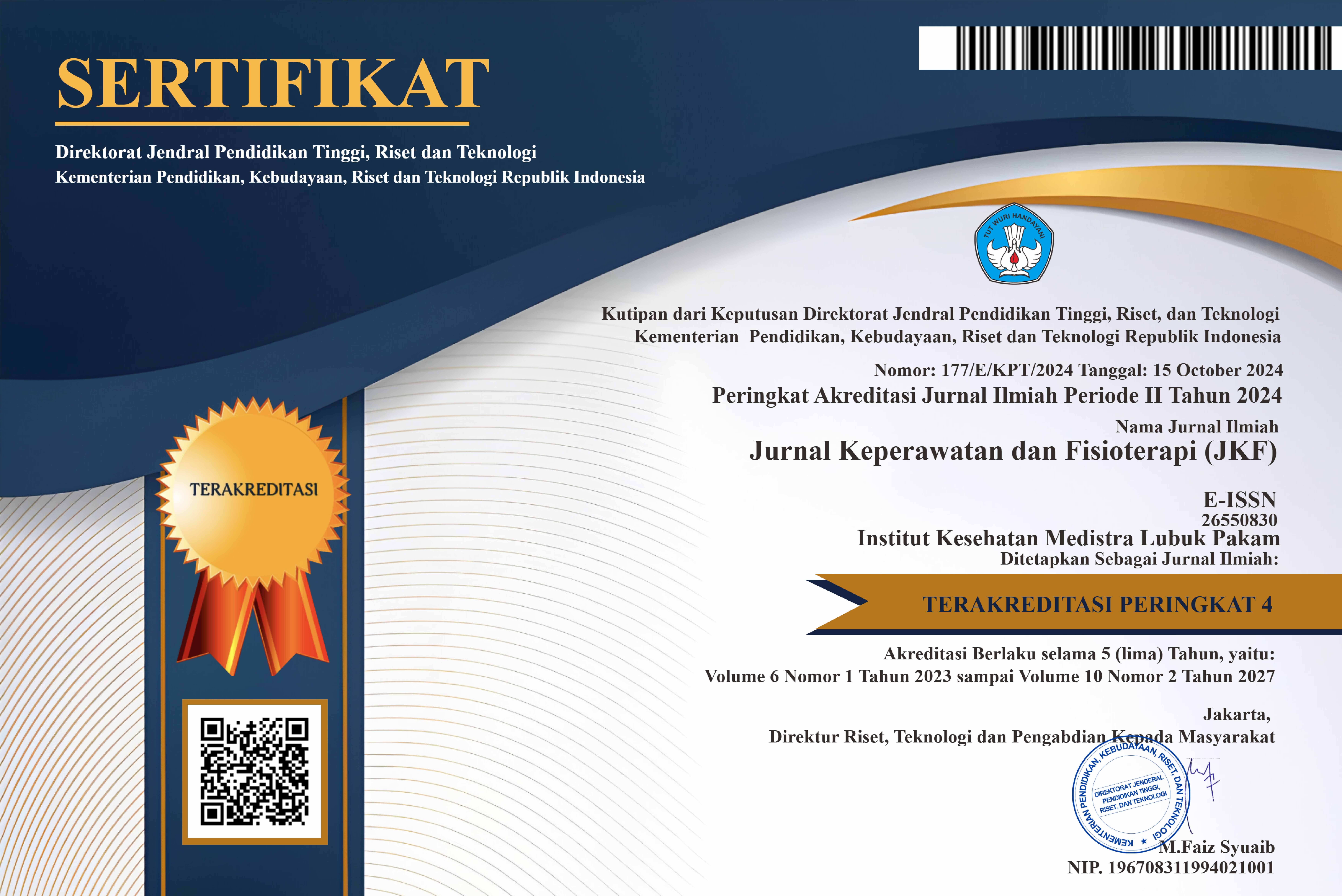Evaluation of Referral System Readiness in Handling Cardiovascular Emergencies in Hospitals
DOI:
https://doi.org/10.35451/jkf.v6i1.2528Keywords:
Referral System; Cardiovascular Emergency; Hospital; Referral ManagementAbstract
Cardiovascular emergencies are among the leading causes of morbidity and mortality worldwide. An effective referral system is crucial to ensuring patients receive timely and optimal care. This study aims to evaluate the readiness of the referral system in handling cardiovascular emergencies in hospitals using a literature review and descriptive analysis method. The findings indicate that infrastructure readiness, medical personnel capacity, and coordination between healthcare facilities play crucial roles in the effectiveness of the referral system. However, challenges such as limited medical transportation facilities and lack of integration of information technology in referral communication persist. Therefore, efforts to enhance policies and technological innovations in the referral system are required to improve services for cardiovascular emergency patients. Additionally, developing better communication networks and improving the competencies of medical personnel in handling emergency referrals are essential factors. The success of the referral system depends not only on technical preparedness but also on regulatory support and policies that facilitate rapid referral processes. The implementation of telemedicine systems, continuous training, and strengthening cross-sector healthcare coordination will significantly support the effectiveness of the referral system. With a holistic approach, the referral system can become more responsive in managing cardiovascular emergencies, ultimately reducing mortality rates and improving healthcare service quality.
Downloads
References
World Health Organization. (2022). Emergency Medical Services Systems and Response Time Improvement.
American College of Cardiology. (2021). Delays in Referral and Mortality in Acute Myocardial Infarction.
Smith, R. et al. (2020). Challenges in Cardiovascular Referral Systems in Low-Resource Settings.
World Health Organization. (2022). Emergency Transport Systems and Their Impact on Patient Outcomes.
American Heart Association. (2021). Advanced Cardiac Life Support: Training and Implementation Guidelines.
Jones, P. et al. (2019). Telemedicine in Emergency Cardiovascular Care: A Systematic Review.
Brown, K., et al. (2020). Real-Time Data Sharing and Its Impact on Referral Efficiency. Journal of Medical Technology, 15(3), 98-112.
Lee, H. & Kim, S. (2021). Barriers to Telemedicine Adoption in Emergency Care Systems. Health Informatics Review, 19(2), 150-165.
Thompson, M., et al. (2021). Optimizing Emergency Referral Pathways: A Multicenter Analysis. International Journal of Healthcare, 30(1), 45-60.
Green, J. & Patel, R. (2022). The Role of Emergency Transport in Reducing Cardiovascular Mortality. Emergency Medicine Journal, 29(4), 77-91.
Anderson, B., et al. (2021). Effectiveness of ACLS Training in Improving Cardiovascular Emergency Outcomes. American Journal of Cardiology, 50(3), 120-135.
Wilson, D., et al. (2020). Mentorship and Knowledge Transfer in Emergency Cardiology Training. Journal of Medical Education, 18(2), 60-75.
Carter, S. & Evans, P. (2021). Regulatory Policies and Their Impact on Emergency Referral Efficiency. Health Policy Review, 25(1), 33-48.
Harrison, L., et al. (2022). Improving Referral Efficiency Through Digital Health Innovations. Journal of Telemedicine and Health Systems, 20(2), 99-113.
Martin, R., et al. (2021). Emergency Response Time and Cardiovascular Outcomes: A Systematic Review. Cardiovascular Research Journal, 28(3), 145-159.
Kim, Y., et al. (2020). The Impact of Electronic Health Records on Referral Systems in Emergency Care. Journal of Health Informatics, 17(4), 210-225.
Taylor, J., et al. (2021). Reducing Transfer Delays in Cardiovascular Emergencies: Best Practices and Challenges. Emergency Medicine Review, 32(1), 58-73.
Robinson, M., et al. (2022). Data-Driven Approaches for Optimizing Cardiovascular Emergency Referrals. Journal of Medical Data Science, 22(3), 178-192.
Harris, P. & Thompson, G. (2021). Strategies for Enhancing Coordination in Emergency Referral Networks. International Journal of Emergency Medicine, 35(2), 88-104.
Liu, X., et al. (2022). Evaluating the Impact of Ambulance Services on Cardiovascular Emergency Outcomes. Emergency Transport Review, 27(3), 120-135.
Additional Files
Published
Issue
Section
License
Copyright (c) 2023 Rudi Erwin Kurniawan

This work is licensed under a Creative Commons Attribution 4.0 International License.
Copyright in each article is the property of the Author.


























